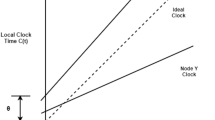Abstract
This paper studies the secure and accurate clock synchronization problem for sensor networks with time-varying delays and malicious attacks. A novel clock synchronization scheme based on the attack detection mechanism, attack compensation, and maximum consensus protocol is proposed. The proposed scheme starts with the detection of the malicious attacks and the clock data under attacks is eliminated. On the basis, software clock parameters are updated so that all the nodes in the network can have the same software skew and offset, so the clock synchronization can be achieved. Furthermore, it is theoretically proved that the proposed scheme can achieve the attack detection correctly, and further can guarantee a secure and accurate clock synchronization. In addition, extensive simulations are also conducted to validate the effectiveness of the proposed scheme.
Similar content being viewed by others
References
Benzaida C, Bagaab M, and Younis M, Efficient clock synchronization for clustered wireless sensor networks, Ad Hoc Networks, 2017, 56(1): 13–27.
Huang B, Yu J, Cheng X, et al., SINR based shortest link scheduling with oblivious power control in wireless networks, Journal of Network and Computer Applications, 2017, 77(1): 64–72.
Elson J, Girod L, and Estrin D, Fine-grained network time synchronization using reference broadcasts, Proc. of OSDI, 2002, 147–163.
Zachariah D, Dwivedi S, Handel P, et al., Scalable and passive wireless network clock synchronization in LOS environments, IEEE Transactions on Wireless Communications, 2017, 16(6): 3536–3546.
Ganeriwal S, Kumar R, and Srivstava M, Time-sync protocol for sensor networks, Proc. of ACM SenSys, 2003, 138–149.
Maroti M, Kusy B, Simon G, et al., The flooding time synchronization protocol, Proc. of SenSys, 2004, 39–49.
Schenato L and Fiorentin F, Average timesynch: A consensus-based protocol for time synchronization in wireless sensor netwoks, Automatica, 2011, 47(9): 1878–1886.
He J, Cheng P, and Shi L, SATS: Secure average-consensus-based clock synchronization in wireless sensor networks, IEEE Transactions on Signal Processing, 2013, 61(24): 6387–6400.
He J, Shi P, Chen J, et al., SATS: Time synchronization in WSNs: A maximum-value-based consensus approach, IEEE Transactions on Automatic Control, 2014, 59(3): 660–675.
He J, Duan X, Cheng P, et al., Accurate clock synchronization in wireless sensor networks with bounded noise, Automatica, 2017, 81: 350–358.
Fu W, Qin J, Shi Y, et al., Resilient consensus of discrete-time complex cyber-physical networks under deception attacks, IEEE Transactions on Industrial Informatics, 2020, 16(7): 4868–4877.
Qin J, Li M, Shi L, et al., Optimal denial-of-service attack scheduling with energy constraint over packet-dropping networks, IEEE Transactions on Automatic Control, 2018, 63(1): 1648–1663.
Song H, Zhu S, and Cao G, Attack-resilient time synchronizationfor wireless sensor networks, Ad Hoc Networks, 2007, 5(1): 112–125.
Yuan Y, Yuan H, Ho D, et al., Resilient control of wireless networked control system under denial-of-service attacks: A cross-layer design approach, IEEE Transactions on Cybernetics, 2018, 50(1): 1–13.
Zhang X, Chen H, Lin K, et al., RMTS: A robust clock synchronization scheme for wireless sensor networks, Journal of Network and Computer Applications, 2019, 135(1): 1–10.
Xie L, Mo Y, and Sinopoli B, False data injection attacks in electricity markets, IEEE International Conference on Smart Grid Communications, 2010, 226–231.
Kikuya Y, Dibaji S M, and Ishii H, Fault-tolerant clock synchronization over unreliable channels in wireless sensor networks, IEEE Transactions on Control of Network Systems, 2017, 5(4): 1551–1562.
Qiu T, Zhang Y, Qiao D, et al., A robust time synchronization scheme for industrial internet of things, IEEE Transactions on Industrial Informatics, 2018, 14(8): 3570–3580.
Sinan K, Carli R, and Schenato L, Adaptive proportional-integral clock synchronization in wireless sensor networks, IEEE Transactions on Control Systems Technology, 2018, 26(2): 610–623.
Xie K, Cai Q, and Fu M, A fast clock synchronization algorithm for wireless sensor networks, Automatica, 2018, 92: 133–142.
Bolognani S, Carli R, Lovisari E, et al., A randomized linear algorithm for clock synchronization in multi-agent systems, IEEE 51st IEEE Conference on Decision and Control (CDC), 2012, 20–25.
Li M and Wu Y C, Distributed clock synchronization for wireless sensor networks using belief propagation, IEEE Transactions on Signal Processing, 2011, 59(11): 5404–5414.
He J, Zhou M, and Cheng P, Consensus under bounded noise in discrete network systems: An algorithm with fast convergence and high accuracy, IEEE Transactions on Cybernetics, 2016, 46(12): 2874–2884.
Garone E, Gasparri A, and Lamonaca F, Clock synchronization protocol for wireless sensor networks with bounded communication delay, Automatica, 2015, 59(1): 60–72.
Carli R and Zamieri S, Network clock synchronization based on the second order linear consensus algorithm, IEEE Transactions on Automatic Control, 2014, 59(2): 409–422.
Author information
Authors and Affiliations
Corresponding author
Additional information
This research was supported by the National Natural Science Foundation of China under Grant No. 61973082 and Six Talent Peaks Project in Jiangsu Province under Grant No. XYDXX-005.
his paper was recommended for publication by Editor SUN Jian.
Rights and permissions
About this article
Cite this article
Zhang, X., Liu, Y. & Zhang, Y. A Secure Clock Synchronization Scheme for Wireless Sensor Networks Against Malicious Attacks. J Syst Sci Complex 34, 2125–2138 (2021). https://doi.org/10.1007/s11424-021-0002-y
Received:
Revised:
Published:
Issue Date:
DOI: https://doi.org/10.1007/s11424-021-0002-y




